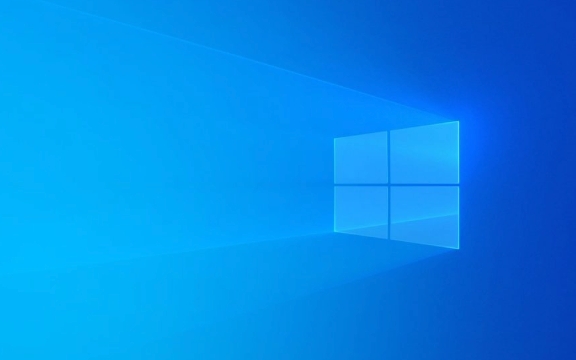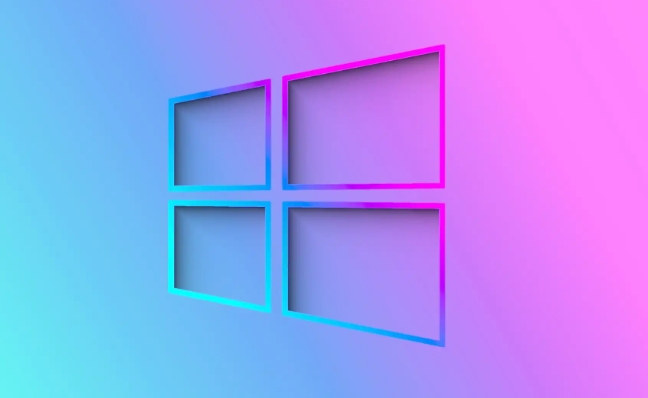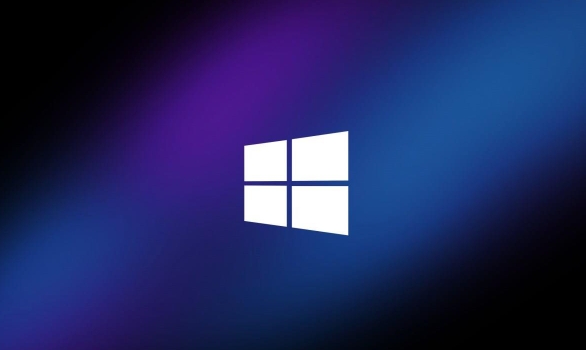 System Tutorial
System Tutorial
 Windows Series
Windows Series
 Why am I getting low FPS after a Windows update, and how to fix it?
Why am I getting low FPS after a Windows update, and how to fix it?
If you experience low FPS after a Windows update, check graphics drivers, adjust visual effects, manage background processes, and verify game-specific settings. 1. Update or roll back your GPU driver via Device Manager or the manufacturer’s website. 2. Adjust Windows visual effects for best performance by disabling animations and transparency. 3. Use Task Manager to identify and end resource-heavy background processes like Windows Search or telemetry services, and set power plan to High Performance. 4. Check for game compatibility issues, reinstall or verify game files, ensure the game is patched, and confirm display mode settings are optimal. These steps typically resolve performance drops caused by Windows updates.

If you've recently updated Windows and suddenly noticed your games or apps are running slower — like your frame rates dropped out of nowhere — you're not alone. Windows updates can sometimes mess with drivers, system settings, or even background processes that affect performance. The good news is, there are several things you can do to get your FPS back up.

Check for Graphics Driver Issues
One of the most common reasons for low FPS after a Windows update is outdated or incompatible graphics drivers. Sometimes, an update might roll back your driver or install a version that doesn't play well with your GPU.
Here's what you can try:

- Go to Device Manager, expand Display adapters, right-click your GPU, and choose Update driver.
- Alternatively, go directly to your GPU manufacturer’s website (NVIDIA, AMD, or Intel) and download the latest driver manually.
- If you had a working driver before the update, you can also roll it back by going to the same menu and selecting Properties > Driver > Roll Back Driver (if available).
This step often fixes sudden performance drops because drivers are crucial for how your system talks to the GPU.
Adjust Windows Visual Effects for Performance
Windows sometimes enables more visual effects after an update, especially if it's a major one like a feature upgrade. These effects can take up resources that could otherwise be used for gaming or rendering.

To tweak this:
- Open System Properties (you can search for it in the Start menu).
- Under the Advanced tab, click Settings under Performance.
- Choose Adjust for best performance, or manually uncheck animations and transparency effects that you don’t need.
You might not notice a huge difference in games, but some apps and games can benefit from a leaner visual setup, especially on lower-end systems.
Stop Background Processes from Hogging Resources
After a Windows update, background tasks like indexing or telemetry services may kick in, eating up CPU, RAM, or disk usage. That can definitely impact FPS, particularly in less powerful machines.
What to do:
- Press
Ctrl Shift Escto open Task Manager. - Check the CPU, Memory, Disk, and Background processes tabs to spot any unusual activity.
- If something like Windows Search, Windows Update, or Cloud Experience Host is using a lot of resources, right-click and End task (but avoid killing critical system processes unless you know what they do).
Also, make sure to set high-performance mode:
- Go to Control Panel > Power Options and select High performance (or adjust the current plan to maximize performance).
Watch Out for Game-Specific Settings or Conflicts
Sometimes the issue isn’t system-wide — just certain games suffer from low FPS after a Windows update. This can happen due to compatibility issues or changes in how DirectX or Vulkan works post-update.
Try these:
- Launch the game through its launcher or Steam, and check if there’s a compatibility warning.
- Reinstall or verify the game files via Steam or Epic Launcher.
- Make sure the game has the latest patch — developers often release hotfixes after major OS updates.
Also, check if your game is running in the correct display mode (fullscreen vs. borderless) — sometimes updates reset those preferences, leading to unexpected performance hits.
Basically, when you’re hit with low FPS after a Windows update, start with drivers, then look at background processes and visual settings. Most of the time, it’s not a deep-rooted problem — just something that got shifted around during the update. Fixing one or two of these areas usually gets things back to normal.
The above is the detailed content of Why am I getting low FPS after a Windows update, and how to fix it?. For more information, please follow other related articles on the PHP Chinese website!

Hot AI Tools

Undress AI Tool
Undress images for free

Undresser.AI Undress
AI-powered app for creating realistic nude photos

AI Clothes Remover
Online AI tool for removing clothes from photos.

Clothoff.io
AI clothes remover

Video Face Swap
Swap faces in any video effortlessly with our completely free AI face swap tool!

Hot Article

Hot Tools

Notepad++7.3.1
Easy-to-use and free code editor

SublimeText3 Chinese version
Chinese version, very easy to use

Zend Studio 13.0.1
Powerful PHP integrated development environment

Dreamweaver CS6
Visual web development tools

SublimeText3 Mac version
God-level code editing software (SublimeText3)

Hot Topics
 How to remove password from Windows 11 login
Jun 27, 2025 am 01:38 AM
How to remove password from Windows 11 login
Jun 27, 2025 am 01:38 AM
If you want to cancel the password login for Windows 11, there are three methods to choose: 1. Modify the automatic login settings, uncheck "To use this computer, users must enter their username and password", and then restart the automatic login after entering the password; 2. Switch to a passwordless login method, such as PIN, fingerprint or face recognition, configure it in "Settings>Account>Login Options" to improve convenience and security; 3. Delete the account password directly, but there are security risks and may lead to some functions being limited. It is recommended to choose a suitable solution based on actual needs.
 I Became a Windows Power User Overnight With This New Open-Source App from Microsoft
Jun 20, 2025 am 06:07 AM
I Became a Windows Power User Overnight With This New Open-Source App from Microsoft
Jun 20, 2025 am 06:07 AM
Like many Windows users, I am always on the lookout for ways to boost my productivity. Command Palette quickly became an essential tool for me. This powerful utility has completely changed how I interact with Windows, giving me instant access to the
 How to uninstall programs in Windows 11?
Jun 30, 2025 am 12:41 AM
How to uninstall programs in Windows 11?
Jun 30, 2025 am 12:41 AM
There are three main ways to uninstall programs on Windows 11: 1. Uninstall through "Settings", open the "Settings" > "Apps" > "Installed Applications", select the program and click "Uninstall", which is suitable for most users; 2. Use the control panel, search and enter "Control Panel" > "Programs and Functions", right-click the program and select "Uninstall", which is suitable for users who are accustomed to traditional interfaces; 3. Use third-party tools such as RevoUninstaller to clean up more thoroughly, but pay attention to the download source and operation risks, and novices can give priority to using the system's own methods.
 How to run an app as an administrator in Windows?
Jul 01, 2025 am 01:05 AM
How to run an app as an administrator in Windows?
Jul 01, 2025 am 01:05 AM
To run programs as administrator, you can use Windows' own functions: 1. Right-click the menu to select "Run as administrator", which is suitable for temporary privilege hike scenarios; 2. Create a shortcut and check "Run as administrator" to achieve automatic privilege hike start; 3. Use the task scheduler to configure automated tasks, suitable for running programs that require permissions on a scheduled or background basis, pay attention to setting details such as path changes and permission checks.
 Windows 10 KB5061087 fixes Start menu crash, direct download links
Jun 26, 2025 pm 04:22 PM
Windows 10 KB5061087 fixes Start menu crash, direct download links
Jun 26, 2025 pm 04:22 PM
Windows 10 KB5061087 is now rolling out as an optional preview update for those on version 22H2 with Start menu fixes.
 Windows 11 Is Bringing Back Another Windows 10 Feature
Jun 18, 2025 am 01:27 AM
Windows 11 Is Bringing Back Another Windows 10 Feature
Jun 18, 2025 am 01:27 AM
This might not be at the top of the list of features people want to return from Windows 10, but it still offers some usefulness. If you'd like to view the current minutes and seconds without turning on that display in the main taskbar clock (where it
 Microsoft: DHCP issue hits KB5060526, KB5060531 of Windows Server
Jun 26, 2025 pm 04:32 PM
Microsoft: DHCP issue hits KB5060526, KB5060531 of Windows Server
Jun 26, 2025 pm 04:32 PM
Microsoft confirmed that the DHCP server service might stop responding or refuse to connect after the June 2025 Update for Windows Server.
 Building Your First Gaming PC in 2025: What You Actually Need
Jun 24, 2025 am 12:52 AM
Building Your First Gaming PC in 2025: What You Actually Need
Jun 24, 2025 am 12:52 AM
In the past, I always viewed the i5 lineup as anemic when it came to gaming. However, in 2025, a mid-range CPU is more than enough to start your gaming journey. Many games still don’t fully utilize multi-core performance as well as they could, so





